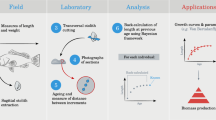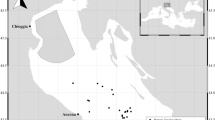Abstract
INFORMATION on the rate of growth of all species of Lepas is scanty. Stanley Kemp, in a letter to J. F. Anton1, quotes three sources, the first of which, referring to an unspecified Lepas, gives an increase in capitulum length of about 1 mm. a day; the second and third, referring to L. anserifera, give increases of 8 mm. in 8 days, 21 mm. in 40 days and 25 mm. in 107 days. In all cases these are minimum rates since they refer to ships and to a buoy known to be free of barnacles at one date and supporting barnacles of quoted size at another, the moment of settling being unknown.
This is a preview of subscription content, access via your institution
Access options
Subscribe to this journal
Receive 51 print issues and online access
$199.00 per year
only $3.90 per issue
Buy this article
- Purchase on Springer Link
- Instant access to full article PDF
Prices may be subject to local taxes which are calculated during checkout
Similar content being viewed by others
References
Anton, J. F., Scot. Nat., 61, 65 (1949).
Evans, F., J. Inst. Navig., 8, 205 (1955).
Author information
Authors and Affiliations
Rights and permissions
About this article
Cite this article
EVANS, F. Growth and Maturity of the Barnacles Lepas hillii and Lepas anatifera. Nature 182, 1245–1246 (1958). https://doi.org/10.1038/1821245b0
Issue Date:
DOI: https://doi.org/10.1038/1821245b0
This article is cited by
-
Seasonal growth rates of gooseneck barnacles (Lepas spp.): Proxies for floating time of rafts in marine ecosystems
Marine Biology (2024)
-
An example for transatlantic hitchhiking by macrozoobenthic organisms with a research vessel
Helgoland Marine Research (2021)
-
The ecology of Lepas-based biofouling communities on moored and drifting objects, with applications for marine forensic science
Marine Biology (2021)
-
Relationship of diversity and habitat area in North Pacific plastic-associated rafting communities
Marine Biology (2014)
-
Effects of temperature and food availability on growth and reproduction in the neustonic pedunculate barnacle Lepas anserifera
Marine Biology (2010)
Comments
By submitting a comment you agree to abide by our Terms and Community Guidelines. If you find something abusive or that does not comply with our terms or guidelines please flag it as inappropriate.



